Allergy & Immunology Fellowship
The Allergy & Immunology Fellowship at Northwestern University Feinberg School of Medicine is a large, multidisciplinary program with several interdepartmental collaborations in clinical care as well as clinical and bench research, which take place at Northwestern Memorial Hospital and Ann & Robert H. Lurie Children’s Hospital of Chicago. The goals of our Allergy and Immunology Fellowship Program are to:
- Train internists and pediatricians to become leaders allergy and immunology who are highly competent in diagnosing and managing patients with a broad spectrum of allergic and immunologic conditions.
- Educate patients, their families and other healthcare professionals.
- Provide trainees the opportunity and resources to pursue careers in academic allergy and immunology.
In addition, the program encourages trainees to pursue careers in academic allergy and immunology. In the past five years, 70 percent of our fellows have pursued academic careers. Our pass rate in the ABAI examination has been 100 percent since 2002.
About the Fellowship
Education
Our ACGME-accredited fellowship, regulated by the McGaw Medical Center of Northwestern University, accepts four MD or DO fellows annually into a two-year program. Additional research years are encouraged for those pursuing academic careers.
The program meets ACGME standards with 50 percent clinical activities, 25 percent research and 25 percent educational activities. Fellows engage in comprehensive clinical training supported by our 24-member faculty, including 17 allergist-immunologists and seven PhD researchers, collaborating across Northwestern hospitals.
Fellows complete a complete a five-week clinical orientation course and a 15-week Introductory Basic Immunology course. Weekly conferences include CME-accredited Allergy-Immunology Topics, Journal Club, Board Reviews, Divisional Research Talks and guest presentations from local, national and international experts.
Research & Further Education
Our structured research program allows fellows to develop and execute unique projects with mentorship from leading researchers tailored to their fellowship and career goals. Opportunities for advanced degrees include a Master of Science in Clinical Investigation (MSCI) and other programs such as MPH, MSB, MSHQPS and MSHSOR available at Northwestern.
Professional Development & Resources
Fellows attend national conferences such as AAAAI, ACAAI, the Allergy-Immunology Board Review Course and local ISAAI meetings, with additional travel support provided beyond society grants.
Upon reaching performance milestones, fellows receive key textbooks, including "Basic Immunology" by Abbas et al., "Patterson’s Allergic Diseases" by Grammer and Greenberger and "Middelton's Allergy Principles and Practice" by Burks et al.
Clinical Experience
Clinical Training Locations
Training occurs at Northwestern Memorial Hospital, Prentice Women’s Hospital, and Ann & Robert H. Lurie Children’s Hospital of Chicago. U.S. News & World Report ranks NMH No.1 in Illinois, listing it on the Best Hospitals Honor Roll nationally and ranked Lurie Children’s Hospital No.1 in Illinois for children’s hospitals.
At Lurie Children’s Hospital, we care for hundreds of children with primary immunodeficiency and perform bone marrow transplants for severe cases in collaboration with the Hematology-Oncology service. Learn more about our pediatric fellowship activities.
Program Excellence
Recognized nationwide for extensive outpatient and inpatient training, our program attracts top recruits from leading residencies and academic centers. Alumni often become local leaders, advising other allergists and immunologists in the community.
Collaborative Approach
Both our Medicine and Pediatrics programs work closely with specialties including ENT, Pulmonology, Gastroenterology and Dermatology in clinical care and research, ensuring comprehensive and multidisciplinary patient management.
Research
Our research program features multidisciplinary teams investigating the causes, pathogenesis and treatments of allergic diseases and immunodeficiencies. Supported by the NIAID-funded T32 grant, we offer robust opportunities for translational research.
Fellowship Structure
- First two years: Fellows dedicate a minimum of 25 percent of their effort to research, meeting ACGME requirements.
- Subsequent years: Research commitment increases to 90 percent, allowing in-depth exploration and project leadership.
- Fellowship structure is flexible such that those fellows with a strong interest in research careers can have a modified distribution of their efforts conducive to their research needs.
- Publications: Fellows typically contribute two or more publications, while our faculty publish around 60 papers annually.
Faculty & Research Excellence
Since 2004, our faculty have expanded their research across molecular, cellular, genetic, epidemiological and translational domains, including clinical and comparative effectiveness trials. Funded by NIH (R, U, T, F grants), foundations, societies, industry and private donations, our faculty's diverse interests are detailed in their profiles within the Departments of Medicine and Pediatrics.
Facilities & Resources
- Laboratory space: 5,675 sq. ft. of state-of-the-art bench labs for molecular and cellular research.
- Research cores: Northwestern University provides numerous cores supporting both basic and clinical studies.
- Advanced instruments: Equipped for cutting-edge research in various scientific disciplines.
Research Focus Areas
- Clinical research: Asthma, chronic rhinosinusitis, food allergy, eosinophilic esophagitis, drug allergy, urticaria and primary immunodeficiencies.
- Molecular research: Mechanisms of glucocorticoids, mast cell biology, leukocyte migration and eosinophil biology.
Eligibility
Fellowship applicants will have to complete an ACGME-approved residency in Medicine, Pediatrics or Med-Peds before entering our program. Applications are reviewed in ERAS and acceptance via NRMP.
Application Process
We receive applications through the Electronic Residency Application Service for fellowships (ACGME ID#0201631016) every year From July 1 to Sept. 15. Applications will be reviewed holistically by our faculty. This year, we are excited to implement program signaling. We encourage applicants interested in our program to participate, but signaling is not required.
Application consists of:
- ERAS application form
- Curriculum vitae
- Three or more letters of reference with one being from the residency program director
- Personal statement
- Medical school performance evaluation or transcript
- USMLE transcript
- Photograph
- ECFMG status report (if applicable).
After interviews (September through October), we accept applicants via the National Resident Matching Program site. Our Medicine track code is 2247020F0, and our Pediatric track code is 2247020F1. Match results are published in early December.
Meet Our Fellows
First Year
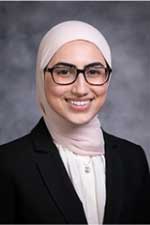
Noor Hamideh, MD
MD: Northwestern University Feinberg School of Medicine
Residency: New York University Grossman School of Medicine
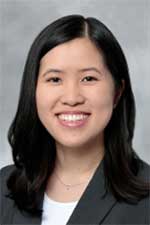
Tori Ly, MD
MD: University of Washington School of Medicine
Pediatric Residency: University of Washington
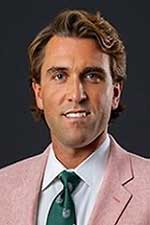
Chas Rupprecht, DO
DO: Rowan-Virtua School of Osteopathic Medicine
Residency: Dartmouth Hitchock Medical Center

Rayna Schwartz, MD
MD: Univesity of Arizona College of Medicine, Tucson
Residency: University of North Carolina Hospitals
Second Year
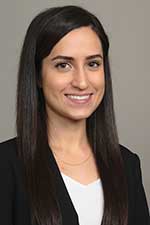
Shabnam Elahi, MD
MD: Georgetown University
Residency: Medstar Georgetown University Hospital
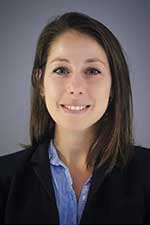
Sofia Halperin-Goldstein, MD (PEDS)
MD: Tufts University
Residency: Yale New Haven Children's Hospital
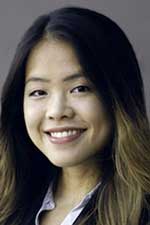
Alexandra Hua, MD, MPH
MD: University of Wisconsin
Residency: University of Michigan, Ann Arbor

Sylvia Li, MD
MD: University of Michigan
Residency: Northwestern University
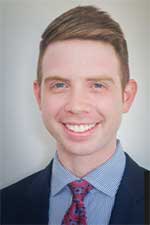
James "JP" Senter, MD, MPH
MD: Johns Hopkins University
Residency: Children's Hospital of Philadelphia
More Information
Further program details, including our housestaff manual and a sample training contract, are available on our McGaw Medical Center Graduate Education website.
